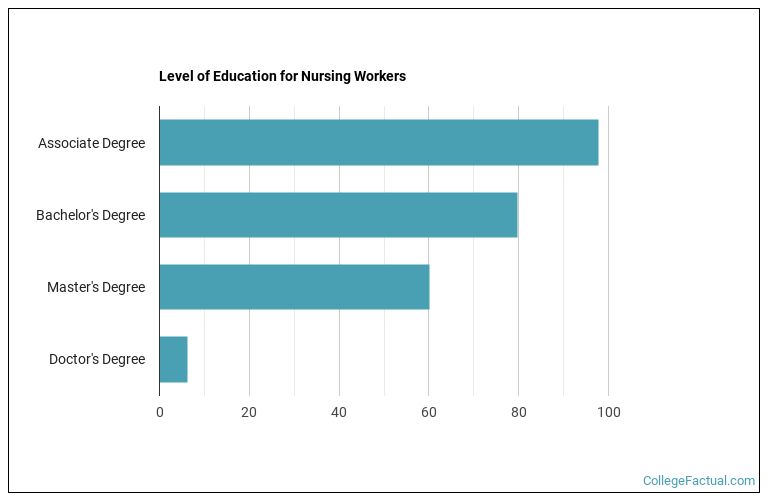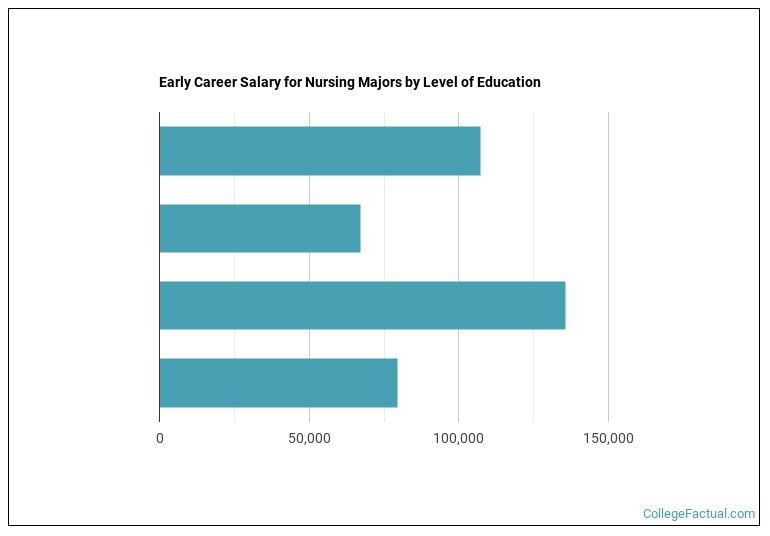 by our College Data Analytics Team
by our College Data Analytics TeamIf you would like to help treat, examine, and heal patients, consider a degree in nursing. A career as a nurse allows you to have face-to-face interaction with people in need; you are on the front-lines in preventing disease, fighting illness and promoting healing.
Nursing students work closely with many patients to perform physicals, administer treatments, aid in diagnostic testing, and provide basic needs, among many other tasks. Classes in biology, anatomy and physiology, pharmacology, medical terminology, psychology, and behavioral science prepare nurses to work in a variety of locations aiding doctors and assisting patients.
Nursing is a broad field and has many areas of specialization available to students. For example, students can choose a major in Registered Nursing or Nursing Administration. Depending on your interest, your studies can also focus on adult health, anesthesia, family practice, maternal and neonatal, midwifery, public health, surgery, critical care, geriatric care and more.
Nursing was the 3rd most popular major in the 2021-2022 school year. Colleges in the United States reported awarding 319,502 degrees in this year alone. Our 2025 Best Nursing Schools ranking analyzes 1768 of these schools to determine the best overall colleges for nursing students. Explore this or one of our many other custom nursing rankings further below.
Since nurses work closely with patients, it is important to have strong interpersonal and communication skills. Nurses must give patients information and keep them calm during procedures and exams. Compassion and sympathy will help you sympathize with patients and make them more comfortable. Additional skills that are required for a career in nursing are analytical and critical thinking, detail-orientation, and patience.
The majority of Nursing graduates work in hospitals, however some also work in medical clinics and schools. Since the public needs health services 24/7, nurses may be required to work at night, on the weekends, and during holidays. They often work rotating shifts so they have time off to rest.
While a bachelor's degree or certification will allow nurses to pursue successful careers in nursing, some students go on to receive a graduate degree. This advanced degree allows nurses to advance to administration positions or conduct research.
New students will need to have completed high school or a GED program and each school will have their own minimum GPA and SAT/ACT test requirements. Once you obtain your degree, additional nursing certifications required to pursue a career in this field.
There are many different nursing degree levels. You can get anything from a in nursing to the highest nursing degree, a . Nursing programs can take anywhere between one to four or more years for a full-time student to complete.
| Degree | Credit Requirements | Typical Program Length |
|---|---|---|
| Associate Degree | 60-70 credits | 2 years |
| Bachelor’s Degree | 120 credits | 4 years |
| Master’s Degree | 50-70 credits | 1-3 years |
| Doctorate | Program required coursework including thesis or dissertation | At least 4 years |
A master's degree is the most common level of education achieved by those in careers related to nursing, with approximately 46.7% of workers getting one. See the the most common levels of education for nursing workers below.
| Level of Education | Percentage of Workers |
|---|---|
| Master’s Degree | 48.2% |
| Associate’s Degree (or other 2-year degree) | 17.9% |
| Bachelor’s Degree | 16.4% |
| Doctoral Degree | 6.1% |
| Post-Master’s Certificate | 5.3% |
About 60.1% of workers in careers related to nursing obtain at least master's degrees. The chart below shows what degree level those who work in nursing have obtained.

This of course varies depending on which nursing career you choose.
Nurses have jobs in many different locations including hospitals, medical centers, schools, the armed forces, corporations, and private medical practices. They teach classes, give medical exams, and update patient information in many settings. Nurses are an important part of the work force and find jobs in almost every area of the medical field.
Due to the aging population and increase in preventative care services, the Nursing occupation is a good profession to be in.
Want a job when you graduate with your nursing degree? Nursing careers are expected to grow 16.5% between 2016 and 2026.
The following options are some of the most in-demand careers related to nursing.
| Occupation Name | Projected Jobs | Expected Growth |
|---|---|---|
| Registered Nurses | 3,393,200 | 14.8% |
| Medical and Health Services Managers | 424,300 | 20.5% |
| Nurse Practitioners | 211,600 | 36.1% |
| Nursing Instructors and Professors | 84,200 | 24.0% |
| Nurse Anesthetists | 48,600 | 16.3% |
Recently graduated nursing students earned an average of $83,052 in <nil>. Earnings can range from as low as $9,648 to as high as $259,426. As you might expect, salaries for nursing graduates vary depending on the level of education that was acquired.

Salaries for nursing graduates can vary widely by the occupation you choose as well. The following table shows the top highest paying careers nursing grads often go into.
| Occupation Name | Median Average Salary |
|---|---|
| Nurse Anesthetists | $174,790 |
| Medical and Health Services Managers | $113,730 |
| Nurse Practitioners | $110,030 |
| Nurse Midwives | $106,910 |
| Nursing Instructors and Professors | $81,350 |
With over 5,922 different nursing degree programs to choose from, finding the best fit for you can be a challenge. Fortunately you have come to the right place. We have analyzed all of these schools to come up with hundreds of unbiased nursing school rankings to help you with this.
Nursing is one of 34 different types of Health Professions programs to choose from.
| Major | Annual Graduates |
|---|---|
| Registered Nursing | 262,974 |
| Family Practice Nurse/Nursing | 16,647 |
| Nursing Practice | 8,862 |
| Nursing Administration | 8,663 |
| Other Registered Nursing, Nursing Administration, Nursing Research and Clinical Nursing | 4,717 |
| Related Major | Annual Graduates |
|---|---|
| Health & Medical Administrative Services | 88,600 |
| Practical Nursing & Nursing Assistants | 85,339 |
| Allied Health Professions | 83,905 |
| Allied Health & Medical Assisting Services | 83,587 |
| Public Health | 41,651 |
Image Credit: By Aleksahgabrielle under License More about our data sources and methodologies.